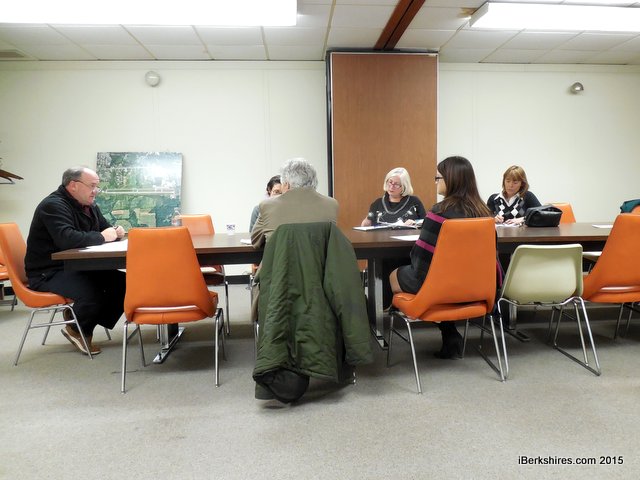
North Adams Armory Project Seeking Tenant in 2015
 A public hearing was held Monday on the next phase of the Armory renovation. This year, CDBG funding will go toward parking and work on the lower levels. A public hearing was held Monday on the next phase of the Armory renovation. This year, CDBG funding will go toward parking and work on the lower levels. |
NORTH ADAMS, Mass. – The city will focus its annual Community Development Block Grant on the Armory’s parking lot and lower levels and is preparing a request for proposals for an agency to operate it.
Director of Community Development Michael Nuvallie said this next step toward rehabilitating the building into a youth community center will mark Phase 10 of the project, which began in 2007 when the city purchased the building from the state.
A public hearing on the use of this year's CDBG funds was held Monday at City Hall with Mayor Richard Alcombright and involved agencies.
The $5 million project has used state and federal funds to slowly improve the former National Guard building. These improvements include total window replacement, roofing, repairs to the gym, installation of an elevator, a new sprinkler system, and improved new office space in the building.
Out of the $825,000 the city plans to receive this year, $576,000 will be used to create a parking area.
Nuvallie said the youth basketball league is the only program using the Armory at the moment and attendees often park on a grassy lot that runs along Royal Avenue between Washington Avenue and Porter Street. He said this will be the targeted area.
"People are parking on the grass so we need make it a formidable parking lot with proper drainage, with fencing, some minor curb cutting, and sidewalk work," Nuvallie said.
He said $324,000 will be used for the engineering and design work for the parking lot; another $252,500 will be used to do more interior work on the lower levels, including the garage that used to house military vehicles.
Where the rest of the money goes is still tentative and dependent on the building's tenants, Nuvallie said.
He said the city is nearly finished with a "Super Tenant" request for proposals that, once released, will indicate what possible tenants may want. He said this will determine how big the garage will be.
"That will dictate to us whether we will spend more money on the inside and less on the parking lot or maybe less on the inside with a more expansive parking lot," Nuvallie said. "We see this as the best and wisest course of action to take at this junction."
Some $35,000 will be used to hire an architect to survey the lower levels.
Nuvallie said the RFP is critical in the Armory's reuse and should be released by the end of winter.
"The city does not desire to get into the situation where we are leasing to six different agencies," he said. "We would like to get one anchor tenant … and let them really take over the life and pulse of the building."
Alcombright said he sees the building providing services for veterans, the elderly and for youth, including sports and drop-in center, and as a possible arts and dance center. He said there is even talk about turning the Armory's old shooting range in the basement into a community theater.
"Our main focus here is to get someone in here. We don't want to, as a city, be running the community center. It is not our function," the mayor said. "We want to find someone who will do a hell of a good job at it and be certain they have all the programs we want to see."
Tags: Armory, CDBG, community center,















